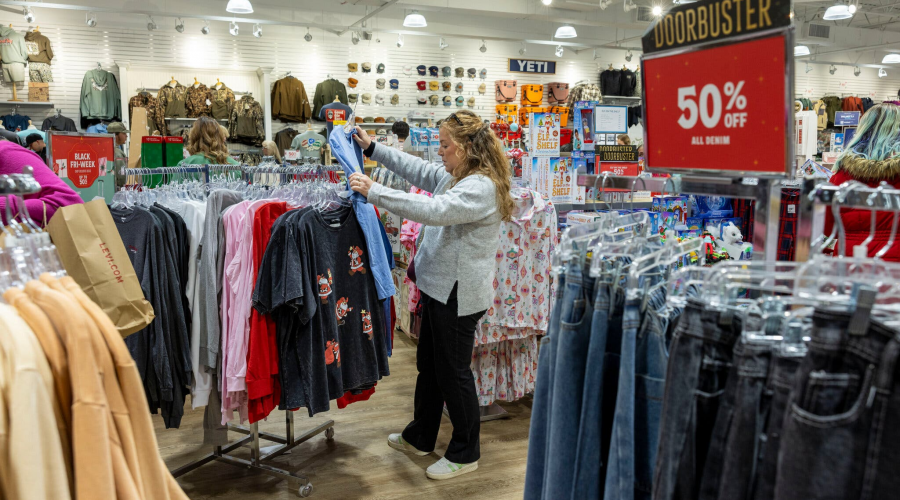President Trump’s broad tariffs are expected to increase the cost of products like cars, electronics, metals, lumber, pharmaceuticals, and other goods that Americans import. However, Trump and his advisers are counting on persuading the public, who are already dealing with inflation, to accept this idea: Cheap goods are not the American dream.
Trump recently stated on NBC’s Meet the Press, “I couldn’t care less if they raise prices, because people are going to start buying American-made cars,” in response to concerns over rising foreign car prices.
This perspective suggests that there’s more to life than just affordable imports, acknowledging that tariffs may increase costs for Americans, but framing it as a worthwhile sacrifice. Whether Trump can convince consumers to accept higher prices in support of domestic manufacturing and his “America First” agenda could significantly impact the success or failure of his second term.
Yet, convincing the public is challenging. The series of tariffs has created market instability and weakened consumer confidence. For instance, auto tariffs set to take effect on Thursday will impose a 25 percent tax on imported cars and car parts, disrupting pricing in the sector. Trump has already levied 20 percent tariffs on Chinese goods, with additional tariffs expected soon, aimed at major trade partners in Asia and Europe.
To address concerns over trade uncertainty, Trump and his top economic aides have asked Americans to think about the bigger picture. They argue that these trade wars are needed to correct decades of economic imbalance, and that paying higher prices is a matter of national pride.
“We may have, short term, a little pain,” Trump said last month when introducing tariffs on Canada and Mexico. “People understand that.” Treasury Secretary Scott Bessent added that the American dream isn’t about access to cheap goods, but rather about good jobs and strong wages. “Access to cheap goods is not the essence of the American dream,” he emphasized.
Bessent’s remarks have reignited a debate within the Republican Party over the use of trade barriers, sidelining traditional conservatives who favor free trade. Former Vice President Mike Pence disagreed with Bessent, arguing that tariffs might pressure nations like China, but free trade ultimately lowers costs and improves the quality of life for Americans.
While there is bipartisan concern about China’s economic practices, Republicans and Democrats differ on how to address these issues. The Biden administration attempted a more targeted approach with tariffs and federal subsidies for clean-energy technology and semiconductors, while the Trump administration favors a broad strategy of tariffs and tax cuts aimed at revitalizing U.S. industry.
However, the rollout of tariffs and delayed changes to the tax code have left economists questioning whether Trump’s strategy can succeed in convincing consumers to tolerate higher prices. Some skeptics, like Stephen Haber from Stanford, argue that Americans may not be willing to accept higher prices and lower wealth in exchange for a nationalistic economy. “Reality tends to trump ideology for most people,” he said, recalling how President Jimmy Carter’s appeal for austerity during the 1970s was met with resistance.
Economic surveys show that while Americans are willing to pay more to support domestic products in some cases, this is limited. The timing of Trump’s tariff initiatives is particularly risky, as his victory in the previous election was driven partly by widespread frustration over rising prices during the Biden administration.
Barry P. Bosworth, who led the Carter administration’s Wage-Price Council, warned that Trump may struggle to sell policies that could raise prices, especially given the relatively healthy economy he inherited.
Trump’s supporters, however, argue that tariffs are only a small part of a broader policy aimed at tax cuts and deregulation, which could ultimately stimulate economic growth. Tomas J. Philipson, who served as acting chair of the Council of Economic Advisers during Trump’s first term, believes that these broader policies will outweigh the economic impact of the tariffs.
Bessent has repeatedly emphasized the idea that the decline of U.S. industrial capacity has hurt the nation, and he made similar arguments as an adviser to Trump last year. He argued that while cheaper imports might improve efficiency, they come at the cost of reliable earnings and job security.
MIT economist David Autor, one of the authors of a study on the impact of cheap imports, agrees with Bessent’s point but doubts whether Trump’s policies will be effective. He noted that planned cuts to federal spending and investment subsidies would primarily benefit conservative states, while tariffs could hurt American firms. He believes that Trump’s tariffs during his first term showed little economic benefit and will ultimately harm his constituents.
In conclusion, while Trump’s tariff strategy is meant to protect domestic industries and strengthen the economy, its success will depend on whether Americans are willing to pay higher prices for the sake of the broader economic goals of nationalistic policies.
